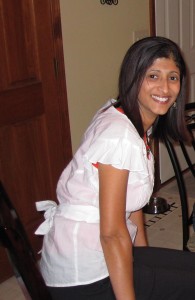This guest post is by Preetha, a hopeful adoptive parent.
 Among all my married colleagues and friends, I’m the only one who doesn’t have a child. A few years ago, it didn’t really bother me.
Among all my married colleagues and friends, I’m the only one who doesn’t have a child. A few years ago, it didn’t really bother me.
But over time, I started noticing that I was being left out: left out of get-togethers (that were predominantly child-oriented), left out of emails, and left out of conversations (again predominantly focused on children).
I also noticed that people were starting to ask questions or make assumptions about why I wasn’t having a baby. They were surprised that as a woman in her thirties, I don’t have at least a pre-teen. That’s when it started getting to me.
Dealing with society’s pressure to have a baby
I began to realize the immense power society has on us, especially women. Society tends to dictate how women should be, what we should want out of life, and at what stage we should want it. Some of my American colleagues confessed that they feel similar pressures.
However, the societal pressure on South Asian women is much, much more. I come from a culture that places tremendous importance on having babies. To make things worse, I come from one of the most populous countries! So it’s naturally hard on me, especially since I seem to be the odd one out.
Anyway, let me describe a couple of tough situations I’ve experienced (and continue to experience) and how I’ve coped with them.
How I handle comments from other parents
Some predominantly South Asian get-togethers are hard for me since I’m invariably the only one who doesn’t have a child. Frequently, conversations tend to revolve primarily around their children. Topics typically range from potty training to Kumon classes.
Given my background in special education, I can contribute to these conversations to some extent. After a point, I’m ready to change topics. I really love kids (which is why I’m planning to adopt).
However, when conversations revolve around them all the time, it’s a constant reminder to me about what I’ve lost (I lost my unborn baby last year) and what I don’t have. They don’t understand how I feel, and I can’t bring myself to request them to not talk about their kids.
Here’s how I’ve attempted to handle the situation. I’ve often changed the topic to something neutral like movies, electronics, fashion, or cooking. This often works, but I find that I have to work hard to maintain this change in topic. Depending on the people involved, sometimes I interject and say, “I don’t have kids but let me brag about my dog for a second. Here’s what she did the other day…”
This often lightens the situation and steers them down a different path. I don’t know if others have experienced the same situation but it’s important to keep in mind that people are not purposely trying to be mean; it’s just that they may not have the same perspective as us.
My advice for others who have chosen open adoption
Among the people I know, I’m the only South Asian woman who is planning to adopt. Adoption, and especially open adoption, is not common among South Asians, and it is not common to place a child for adoption. When we told others about our plans to adopt, all of them said it is a cool thing to do. But a few South Asians were wondering why we are not exhausting all our options of having a biological child.
I’m perceived as different by some people because I’m choosing open adoption over fertility treatments and surrogacy. I deal with these reactions by taking an educational approach and explaining our rationale for choosing open adoption. I’ve also received other questions and comments, and I don’t think these are unique to South Asians. But being a South Asian woman, I get them a lot more.
One frequent comment is “Now that you’re going to adopt, you just watch; you’ll end up being pregnant.” I know they mean well, but this statement irks me!
Again, instead of being sarcastic, I take the educational approach and explain that due to some issues, I wouldn’t be able to conceive naturally and that we have decided not to pursue fertility treatments. The educational approach actually works. I find that people do understand when I explain it to them.
How waiting to adopt has made me a stronger person
I understand these reactions stem from the cultural value that is placed on having a biological child. Over time, I’ve come to realize that I can’t control people’s questions or actions. What I can control is how I perceive my situation and how I respond to it.
My husband has told me several times, “nobody says we have to live our lives a certain way.” I completely agree with that. Being childless in our society has often pushed my limits as a wife, as a potential mother, and most importantly, as a woman.
However, I think it has made me stronger and more decisive about pursuing open adoption. I’m very thankful that our respective families and close friends in our community (including our South Asian friends) are very supportive of our decision and are standing by us.
If there are other South Asian women out there in a similar situation, I can empathize with them. It’s all about being patient, not worrying about what society will think, counting our blessings, and keeping things in perspective.
Preetha and her husband, Don, have been happily married for ten years and are currently living and working in Bloomington, Illinois. They hope to expand their family through open adoption and are working with the Independent Adoption Center (IAC). To learn more about them, view their adoption profile.
Share Your Open Adoption Story
We’re always on the lookout for great open adoption stories and tips to share with our community. If you’re interested in sharing your story, please check out our Guidelines For Guest Posts at America Adopts! We look forward to hearing from you.
(Photo credit: sunshinecity)

